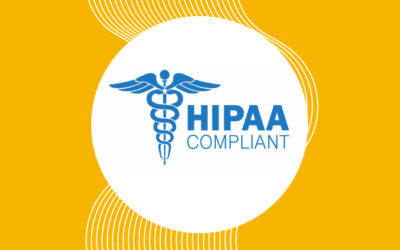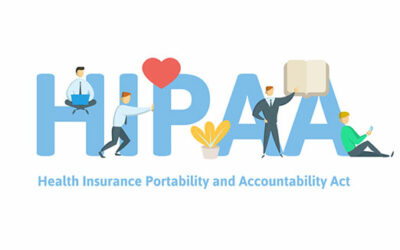
Understanding HIPAA Compliance in Dental Practices
Adhering to the Health Insurance Portability and Accountability Act (HIPAA) is a complex and legally required set of responsibilities. It brings a unique set of challenges to modern dental offices, especially when they are integrating digital technologies. HIPAA’s role in protecting patient information is valid and important, but its complexity can be overwhelming for dental practices transitioning to digital systems. The key lies in effectively managing Protected Health Information (PHI) while ensuring that every piece of patient data is treated with the highest level of confidentiality and security… all without hindering access so the team can do their job.
Electronic PHI (ePHI) Management and Tech Training
As dental offices adopt digital solutions and move towards using Electronic Health Records (EHRs) and online communication platforms, they must ensure these tools comply with HIPAA. This task involves securing data against unauthorized access and using patient information in line with HIPAA’s strict requirements. The challenge intensifies with the need to maintain this compliance amidst evolving digital practices and technologies.
Unlike industries outside of healthcare, you can’t use just any online form. Online forms have to be HIPAA-compliant, complying with standards on how they store and maintain that data. And patient communication through text and email must be carefully done to not expose any PHI. Making sure that your office can use modern tools and be digitally relevant, yet not violate any HIPAA regulations, is difficult.
Another crucial aspect of dental HIPAA compliance is staff training. Keeping up with HIPAA isn’t a one-off task but an ongoing part of being considered a covered entity, requiring regular training and updates to processes. Dental practices must invest in educating their staff on various HIPAA-related topics, from understanding patient privacy rights to responding to data breaches effectively. This comprehensive training ensures that all team members, regardless of their role, are informed and compliant with HIPAA standards.
The Digital Shift and HIPAA Risks
The shift to digital practices, while beneficial, comes with its own set of HIPAA compliance risks. Dental offices must carefully evaluate their digital workflows to prevent any breaches of patient privacy. This means not just choosing the right EHRs and secure patient communication systems, but also implementing effective data encryption and backup solutions. Modern cloud-based systems significantly reduce the burden for practice owners, taking it on at the software level where compliance is done at scale. Additionally, the HIPAA Journal has compiled the top 10 common HIPAA rule violations and how to avoid them.
Introducing Yapi: A Tool for HIPAA Compliance
Yapi is a modern dental software solution designed to simplify HIPAA compliance. It offers a suite of tools that help dental offices manage digital operations with an emphasis on meeting HIPAA standards. From encrypted patient forms to secure data management, Yapi provides a way for practices to integrate digital solutions without compromising compliance.
HIPAA Data Management and Security
Detailed Compliance in Data Handling
Compliance with HIPAA’s data management and security regulations involves a comprehensive understanding of how patient data is stored, accessed, and ultimately disposed of. For instance, when considering data storage, HIPAA mandates that all electronic protected health information (ePHI) must be encrypted to NIST standards. This means that if a data breach occurs, the information remains unreadable and unusable.
Beyond encryption, HIPAA also requires that practices have strict access controls in place. This includes not only digital access but also physical access to servers and storage devices. For practices not using cloud services, this often translates into having a dedicated, secure server room that’s accessible only to authorized personnel. This level of security is important to protect sensitive patient data from both digital and physical threats.
Retention and Disposal of Patient Records
Retention of patient records under HIPAA comes with its own set of rules. Dental practices are required to retain records for a minimum period, typically six years, though this can vary by state. After this period, or when records are no longer needed, HIPAA demands secure disposal methods. This could mean shredding paper records or ensuring complete and irretrievable deletion of electronic data.
Yapi’s Role in Simplifying Compliance
Compared to these strict regulations, Yapi offers a streamlined and secure solution for dental practices. With Yapi, the complexities of ePHI management are greatly simplified. Yapi’s cloud-based platform ensures that all data is encrypted to the highest standards, thereby addressing the first and perhaps most critical step in HIPAA-compliant data management.
Moreover, Yapi enhances access control by allowing practices to easily manage who has access to what information. This is especially helpful for practices that may not have the infrastructure for a dedicated server room, as Yapi’s cloud-based system inherently provides robust physical and digital security measures.
In terms of data retention and disposal, Yapi again proves super useful. The software is designed to help practices manage their records efficiently, keeping them secure for the required retention period and then facilitating their proper disposal in compliance with HIPAA regulations.
Staying compliant with HIPAA’s data management and security regulations is a complex task that encompasses several aspects of a dental practice’s operations. Yapi is a modern tool that not only addresses these complexities but also casually slips compliance into the daily workflow of dental practices, ensuring that they can focus on patient care without the added burden of regulatory concerns.
Cultivating a Culture of HIPAA Compliance Through Staff Training
Effective HIPAA compliance is deeply rooted in the awareness and actions of every staff member within a dental office. Comprehensive and ongoing staff training is important for maintaining a culture of compliance. Staff must be well-versed in HIPAA regulations, understanding not only the ‘what’ but also the ‘why’ behind each rule. This involves regular training sessions that cover aspects such as patient privacy rights, secure communication protocols, and the correct procedures for handling and reporting potential data breaches.
Practical, scenario-based training can be particularly effective in teaching staff how to apply HIPAA regulations in day-to-day operations. For instance, training sessions might include role-playing exercises that simulate situations where patient information must be securely accessed and shared. Staff could also be trained on how to respond to patient inquiries about their data rights or how to handle the accidental disclosure of PHI. These real-world scenarios help solidify understanding and prepare staff for a variety of situations they may encounter.
Regular Updates and Refreshers
HIPAA regulations and best practices are not static; they evolve. Regular training updates are helpful to keep staff informed about the latest changes and requirements. Refreshers on core HIPAA principles also help to reinforce previous training and ensure that compliance remains top of mind for your staff so that an inadvertent HIPAA violation doesn’t occur.
Yapi plays a pivotal role in reinforcing HIPAA compliance through staff training and daily practice operations. The software’s intuitive design and user-friendly interface make it easier for staff to adhere to compliance protocols in their everyday tasks. For instance, Yapi’s customizable messages and reminders are designed to be HIPAA compliant, minimizing PHI exposure or the opportunities for an inadvertent slip.
Moreover, Yapi can facilitate secure, compliant communication among staff members, allowing for the discussion and reinforcement of HIPAA practices in a practical setting. By integrating HIPAA compliance into its core functionality, Yapi helps ensure that staff members are constantly engaged with and reminded of the importance of these regulations.
Enhancing Patient Communication and Transparency
Effective communication with patients about their data rights is another key component of HIPAA compliance. HIPAA not only mandates the protection of patient data but also requires that patients are fully informed about their rights regarding their personal health information. This involves explaining how their data is used, stored, and protected. Clear and transparent communication helps in building trust, making patients more comfortable with the practice’s handling of their sensitive information.
Educating Patients on Their Rights
Dental practices must take proactive steps to educate their patients about their rights under HIPAA. This includes providing detailed information about how they can access their health records, how they can request changes to their records, and how they can understand the various privacy notices they receive. Such education is often a requirement during patient intake or first visits, but it should also be an ongoing effort, integrated into regular patient interactions.
Another crucial aspect of patient communication under HIPAA is obtaining proper consent and authorization for the use and disclosure of patient information. Dental practices must ensure that patients understand what they are consenting to and have the opportunity to ask questions or seek clarification. This process must be handled delicately and with full transparency to uphold the principles of HIPAA.
Yapi’s Role in Streamlining Patient Communication
Yapi significantly simplifies the process of communicating with patients about their data rights and obtaining necessary consent. With its integrated digital forms and secure messaging system, Yapi provides an efficient platform for distributing privacy notices, obtaining consent, and engaging in secure communications with patients. The platform’s user-friendly interface makes it easier for patients to access and understand their rights, request information, and communicate with the dental office.
Yapi’s automated reminder system can also be used to send out periodic information or updates regarding patient data rights, ensuring continuous education and engagement. Furthermore, the platform’s secure and compliant communication tools enable dental staff to respond promptly and securely to patient inquiries regarding their PHI, further enhancing trust and transparency.
Our List of Best Practices for HIPAA Compliance
Regular HIPAA Training for Staff: Ensure that all staff members in the dental practice, from receptionists to dental hygienists, receive regular HIPAA training. This helps maintain a high level of awareness and understanding of HIPAA regulations and requirements.
Implement Strong Data Encryption: Utilize robust encryption for all electronic patient data, both at rest and in transit, to protect against unauthorized access and HIPAA violations.
Maintain Accurate and Secure Patient Records: Keep patient records accurate and secure, following the HIPAA Privacy Rule. Regular audits of records and access logs can help identify and rectify any compliance gaps.
Develop Clear Privacy Practices: Create and maintain clear privacy practices as per HIPAA guidelines, ensuring that both staff and patients understand how health information is used and protected in the dental office.
Adhere to the HIPAA Security Rule: Implement administrative, physical, and technical safeguards as outlined in the HIPAA Security Rule to protect ePHI.
Ensure Compliance with the HIPAA Breach Notification Rule: Have a clear process in place for reporting and managing any breaches in compliance with the HIPAA Breach Notification Rule.
Regularly Review HIPAA Policies and Procedures: Periodically review and update HIPAA policies and procedures to ensure ongoing compliance and adapt to any changes in HIPAA laws and regulations.
Conduct Risk Assessments: Regularly conduct risk assessments to identify potential vulnerabilities in the handling of PHI and ePHI, and take corrective actions.
Establish Clear Lines of Communication with Patients: Ensure transparent communication with patients regarding their rights under HIPAA, including access to their medical records and an understanding of your office’s privacy practices.
Seek Guidance from HIPAA Experts: When in doubt, consult with HIPAA experts or join a compliance group to stay updated with the latest HIPAA rules, regulations, and best practices.
Utilize HIPAA-Compliant Software and Tools: Leverage tools like Yapi that are designed to aid in HIPAA compliance, helping streamline processes like patient information handling, data security, and staff training.
By following each best practice, health care providers can not only adhere to HIPAA compliance but also foster an environment of trust, safety, and great care for the patients.

